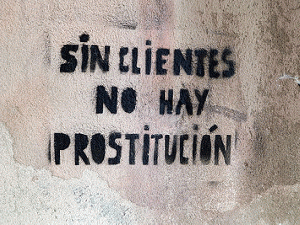If Massachusetts state or
Boston city employees pay for sex, they could lose their jobs.
A new zero tolerance trafficking policy launched by Massachusetts political leaders prohibiting the purchasing of sexual activities is a strategic step forward in combatting the trafficking in women.
On April 19, 2016, Governor Charlie Baker, Attorney General Maura Healey, and Mayor Marty Walsh of Boston announced they would bar public employees and state-funded contractors from buying sex. In a political climate where bipartisan accord is sorely lacking, these three state and city officials agree it is nearly impossible to fight sex trafficking and commercial sexual exploitation without penalizing the demand.It is well known that employees often use work time to surf the Internet for pornography and prostitution. Most people searching for sex online do so on company computers before they leave work. An ongoing study conducted jointly by an industry group called Businesses Ending Slavery and Trafficking (BEST) and the Organization of Prostitution Survivors (OPS) found that 63 per cent of those in prostitution report they were taken to company campuses to engage in sexual activities in venues such as offices or parking garages.
Sex buyers, or "johns" drive the trafficking in women and children for prostitution. In acknowledging that without demand there is no supply, Governor Baker stated: "We remain committed to enacting strict reforms to target the sources of human trafficking." Mayor Walsh has been a longtime advocate of ending commercial sexual exploitation in Boston. Working with the CEASE Network (Cities Empowered Against Sexual Exploitation), he has targeted sex buyers while increasing social services for victims. Attorney General Maura Healey has made it a priority to fight all aspects of human trafficking and to make sex buyers accountable for their actions. In announcing several trafficking indictments, Healey said: --those who would buy sex here in the state -- you are on notice that you are exploiting human beings" If you do that, we will take action."
The Attorney General's human trafficking prevention policy prohibits employees from "Visiting any venue that provides erotic entertainment during work hours or while traveling for work purposes." Further, all employees are expected to refrain from paying for sexual activity "either within or outside the workplace." Governor Baker's Executive Order no. 568 establishes that use of work time or facilities to engage in human trafficking and related activities, "including the solicitation of or payment for commercial sex is cause for discipline up to and including termination."
For eons, we have heard prostitution is inevitable and that men who purchase sex are fulfilling some ill-defined need. Justifications abound that prostitution is a necessary sexual service for lonely men, frustrated men, men who are sexually dissatisfied with their wives or partners, military men on tours of duty, businessmen who have stressful jobs, migrant laborers who are away from wives and family, disabled men who can't "get sex" in any other way, or for ordinary guys who are simply enjoying a night out.
The standard legal response to prostitution has been to penalize the women. In the United States, more than two-thirds of those arrested for solicitation are women. Even when the john is caught in flagrante, police often identify with the "poor man" and the personal and professional consequences that result from his exposure and possible detention. Studies have shown that prostitution users most fear the revelatory effect of being caught.
(Note: You can view every article as one long page if you sign up as an Advocate Member, or higher).





